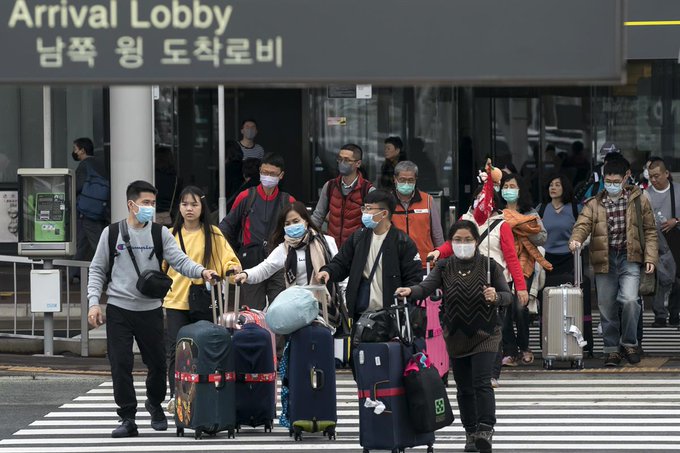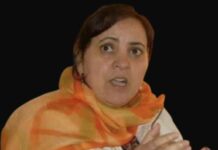New Delhi (NVI) : The World Health Organisation (WHO) believes it is possible to interrupt the spread of the novel coronavirus disease if the countries concerned take certain measures even as the global health body’s Director-General has declared it as a Public Health Emergency of International Concern (PHEIC).
The International Health Regulations (2005) Emergency Committee of the WHO, which held a meeting in Geneva over the outbreak of novel coronavirus (2019-nCoV), said its spread can be contained provided countries put in place strong measures to detect disease early, isolate and treat cases, trace contacts, and promote social distancing measures commensurate with the risk.
The Committee’s role is to give advice to the Director-General, who makes the final decision on the determination of a PHEIC. The Committee also provides public health advice or suggests formal Temporary Recommendations as appropriate.
At the meeting, second since the outbreak, representatives of China’s Ministry of Health reported that there are now 7711 confirmed and 12167 suspected cases throughout the country.
Of the confirmed cases, 1370 are severe and 170 people have died, a statement issued by the WHO said, adding 124 people have recovered and been discharged from hospital.
The WHO Secretariat said there are now 83 cases in 18 countries. Of these, only 7 had no history of travel in China.
There has been human-to-human transmission in 3 countries outside China. One of these cases is severe and there have been no deaths.
At its first meeting, the Committee expressed divergent views on whether this event constitutes a PHEIC or not. At that time, the advice was that the event did not constitute a PHEIC, but the Committee members agreed on the urgency of the situation and suggested that the Committee should continue its meeting on the next day, when it reached the same conclusion, the statement noted.
This second meeting took place in view of significant increases in numbers of cases and additional countries reporting confirmed cases.
The Committee welcomed the leadership and political commitment of the very highest levels of Chinese government, their commitment to transparency, and the efforts made to investigate and contain the current outbreak, the statement said.
China quickly identified the virus and shared its sequence, so that other countries could diagnose it quickly and protect themselves, which has resulted in the rapid development of diagnostic tools.
The very strong measures China has taken include daily contact with WHO and comprehensive multi-sectoral approaches to prevent further spread. It has also taken public health measures in other cities and provinces; is conducting studies on the severity and transmissibility of the virus, and sharing data and biological material, it said.
The country has also agreed to work with other countries which need their support. The measures China has taken are good not only for that country but also for the rest of the world, the WHO statement said.
The Committee acknowledged the leading role of WHO and its partners.
The Committee also acknowledged that there are still many unknowns, cases have now been reported in five WHO regions in one month, and human-to-human transmission has occurred outside Wuhan and outside China.
“The Committee believes that it is still possible to interrupt virus spread, provided that countries put in place strong measures to detect disease early, isolate and treat cases, trace contacts, and promote social distancing measures commensurate with the risk,” the statement said, citing conclusions of the meeting.
“It is important to note that as the situation continues to evolve, so will the strategic goals and measures to prevent and reduce spread of the infection,” it added.
The Committee agreed that the outbreak now meets the criteria for a Public Health Emergency of International Concern and proposed the following advice to be issued as Temporary Recommendations.
“The Committee emphasized that the declaration of a PHEIC should be seen in the spirit of support and appreciation for China, its people, and the actions China has taken on the frontlines of this outbreak, with transparency, and, it is to be hoped, with success,” the statement said.
In line with the need for global solidarity, the Committee felt that a global coordinated effort is needed to enhance preparedness in other regions of the world that may need additional support for that, it said.
The Committee welcomed a forthcoming WHO multidisciplinary technical mission to China, including national and local experts.
It said the mission should review and support efforts to investigate the animal source of the outbreak, the clinical spectrum of the disease and its severity, the extent of human-to-human transmission in the community and in healthcare facilities, and efforts to control the outbreak.
This mission will provide information to the international community to aid in understanding the situation and its impact and enable sharing of experience and successful measures.
The Committee wished to re-emphasize the importance of studying the possible source, to rule out hidden transmission and to inform risk management measures
The Committee also emphasized the need for enhanced surveillance in regions outside Hubei, including pathogen genomic sequencing, to understand whether local cycles of transmission are occurring.
WHO should continue to use its networks of technical experts to assess how best this outbreak can be contained globally.
WHO should provide intensified support for preparation and response, especially in vulnerable countries and regions.
Measures to ensure rapid development and access to potential vaccines, diagnostics, antiviral medicines and other therapeutics for low- and middle-income countries should be developed.
The Committee did not recommend any travel or trade restriction based on the current information available.
The Director-General declared that the outbreak of 2019-nCoV constitutes a PHEIC and accepted the Committee’s advice and issued this advice as Temporary Recommendations under the IHR, the statement said.
It also issued an advisory to China and other countries, particularly emphasising on active surveillance, early detection, isolation and case management, contact tracing and prevention of onward spread.
The WHO reminded all countries that they are legally required to share information with it under the IHR and any detection of 2019-nCoV in an animal (including information about the species, diagnostic tests, and relevant epidemiological information) should be reported to the World Organization for Animal Health (OIE) as an emerging disease.
Countries should place particular emphasis on reducing human infection, prevention of secondary transmission and international spread, and contributing to the international response though multi-sectoral communication and collaboration and active participation in increasing knowledge on the virus and the disease, as well as advancing research.
The Emergency Committee will be reconvened within three months or earlier, at the discretion of the Director-General.








